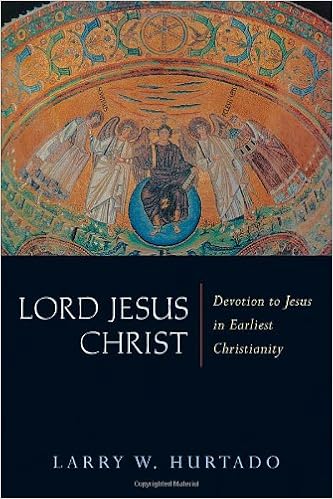In Part 8, we realised that a minority of passages during the canonical era included direct prayer or calling to the Lord Jesus, while reserving prime recipient to God (the Father) himself as the standard Christian pattern. I failed to note that no mention of the Holy Spirit was included in this section - an error on my part. Hurtado's focus is on the ultra-early explosion of Jesus devotion in a Jewish monotheistic context. My focus is on a first-century establishment of a triune hub mutation to the Jewish Christian faith, so the impetus is on me to spot that, research and expand as appropriate.
Since we are on Paul, we should be careful not to fall prey to an "under-realized eschatological perspective" (G. Fee, Paul, the Spirit and the People of God p. 141;), "for Paul prayer has been radically transformed by the coming of the Spirit" (idem. p. 146)" and "[t]he beginning of Christian life is marked by the indwelling Spirit's crying out 'Abba' to God (Gal 4:6; Rom 8:15). On all occasions,' Paul urges elsewhere, 'ray in/by the Spirit'; this injunction applies to every form of prayer (Eph 6:18)." (idem. p. 146). This seems of utter importance to realise that the departed Lord Jesus has given this greatest gift that indeed permits that he and the Father might remain present with his people. Among his people. Literally, in their minds. It's literally mind-blowing! Imagine having a personal life-giving power within you that actually helps you to pray when your own words fail you?
I have to say that it is hard to write about the topic of prayer and the Holy Spirit's inclusion without becoming personally excited and involved!
Praying also gives way to praying in tongues, something else we know that Paul practised and is connected with a series of other spiritual gifts demonstrating the life of the eschatological people of God. Praying in this new way embraces the person's and the congregations' entire mind, it is transformational, it utterly embraces weakness and glorifies God and Christ in the wake of our own inability.
Definitely worth a mention, wouldn't you say?
Since we are on Paul, we should be careful not to fall prey to an "under-realized eschatological perspective" (G. Fee, Paul, the Spirit and the People of God p. 141;), "for Paul prayer has been radically transformed by the coming of the Spirit" (idem. p. 146)" and "[t]he beginning of Christian life is marked by the indwelling Spirit's crying out 'Abba' to God (Gal 4:6; Rom 8:15). On all occasions,' Paul urges elsewhere, 'ray in/by the Spirit'; this injunction applies to every form of prayer (Eph 6:18)." (idem. p. 146). This seems of utter importance to realise that the departed Lord Jesus has given this greatest gift that indeed permits that he and the Father might remain present with his people. Among his people. Literally, in their minds. It's literally mind-blowing! Imagine having a personal life-giving power within you that actually helps you to pray when your own words fail you?
I have to say that it is hard to write about the topic of prayer and the Holy Spirit's inclusion without becoming personally excited and involved!
Praying also gives way to praying in tongues, something else we know that Paul practised and is connected with a series of other spiritual gifts demonstrating the life of the eschatological people of God. Praying in this new way embraces the person's and the congregations' entire mind, it is transformational, it utterly embraces weakness and glorifies God and Christ in the wake of our own inability.
Definitely worth a mention, wouldn't you say?


No comments:
Post a Comment
Thanks very much for your feedback, really appreciate the interaction.